Main navigation
Search Results
-
Funding Funding programme, Funded by: European Commission, sb_search.searchresult.label.programSubmissionDate: 18/09/2024https://www.biooekonomie-bw.de/en/databases/funding/eic-transition-1 -
ProGrün project - 30/12/2023 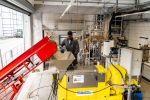
Using proteins extracted from grassland cuttings to produce animal feed and exploit by-product streams
Animal feed often contains protein from soy and importing it causes major environmental harm. In the ProGrün project, researchers at the University of Hohenheim, including a work group led by Prof. Dr. Andrea Kruse, are developing a scalable technological process to extract proteins from grassland cuttings and use them to make sustainable animal feed produced in the region where it will be used.
https://www.biooekonomie-bw.de/en/articles/news/using-proteins-extracted-grassland-cuttings-produce-animal-feed-and-exploit-product-streams -
Alternative construction materials: mycelium-based materials - 20/12/2023 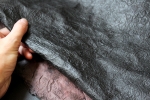
Using fungi to create sustainable and economical mycelium-based materials
Most of us see fungi as just food - and possibly pathogens. This is a mistake, because these amazing organisms are capable of much more: they grow on plant residues of all kinds, forming a dense and interconnected structure as they spread. The resulting material can be moulded into desired shapes and be turned into new sustainable and economically attractive products such as leather and polystyrene substitutes or building materials.
https://www.biooekonomie-bw.de/en/articles/news/using-fungi-create-sustainable-and-economical-mycelium-based-materials -
Facade greening with precipitation retention - 19/12/2023 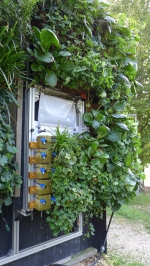
Rain-retaining living walls improve the urban climate and protect against flooding
Due to dense urbanisation and associated soil sealing, heat and heavy rainfall are becoming an increasing problem for people living in cities. Researchers at the German Institutes of Textile and Fibre Research (DITF) in Denkendorf have developed innovative living walls that not only help cool the environment, but also provide flood protection thanks to their water retention properties.
https://www.biooekonomie-bw.de/en/articles/news/rain-retaining-living-walls-improve-urban-climate-and-protect-against-flooding -
Sustainable binder alternative - 18/12/2023 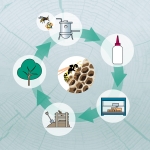
Copied from insects: new biological wood binder under development
Plastic is all around us; and unfortunately, it is not going away any time soon. The search for more sustainable solutions is fully underway. However, binders that degrade only with difficulty or not at all are still used to bond natural materials such as wood and straw - not yet truly environmentally friendly. Fraunhofer researchers are working on an insect-inspired wood binder that makes bonded wood products both resistant and biodegradable.
https://www.biooekonomie-bw.de/en/articles/news/copied-insects-new-biological-wood-binder-under-development -
urban BioEconomyLab - 07/12/2023 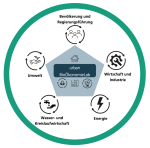
The city as a living laboratory for a bioeconomic, sustainable economic area
Baden-Württemberg is leading the way in the transition to a climate-neutral and sustainable economy. One of the projects undertaken is the Fraunhofer IGB’s "urban BioEconomyLab" project which aims to develop a transformation model and living laboratory to find bioeconomic solutions for the sustainable design of cities and municipal industry. What is new is that the IGB takes a systemic approach, focusing on biobased and circular value…
https://www.biooekonomie-bw.de/en/articles/news/city-living-laboratory-bioeconomic-sustainable-economic-area -
Recent research shows effectiveness of biosurfactants - 28/11/2023 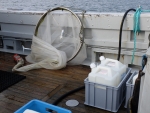
Combating oil spills - biosurfactants can stimulate microbial oil degradation
Oil spills from drilling platforms and tankers cause environmental pollution and a loss of biodiversity. Researchers at the University of Stuttgart, among others, are now using biosurfactants to improve the management of oil spills: their latest research shows that biosurfactants lead to better microbiological degradation of oil components in seawater compared to conventional dispersants.
https://www.biooekonomie-bw.de/en/articles/news/combating-oil-spills-biosurfactants-can-stimulate-microbial-oil-degradation -
The AlbLavendel project - 20/11/2023 
Swabian lavender cultivation: aesthetic and sustainable
Blue-violet, fragrant fields like those in Provence may soon become a common sight in the Swabian Alb. As part of the AlbLavendel project, the University of Hohenheim along with the company naturamus GmbH and the German Institutes of Textile and Fibre Research Denkendorf has started to investigate the cultivation of lavender, the production of essential oils and the use of distillation residues for producing textile fibres in the local region.
https://www.biooekonomie-bw.de/en/articles/news/swabian-lavender-cultivation-aesthetic-and-sustainable -
Event - Sharing Knowledge about: Insect Biorefineries and AI Tools
Online, Informationsveranstaltunghttps://www.biooekonomie-bw.de/en/events/sharing-knowledge-about-insect-biorefineries-and-ai-tools -
Climate-neutral wastewater treatment plants thanks to patented real-time analytics - 08/11/2023 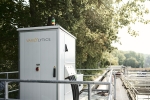
Using AI to reduce greenhouse gases in wastewater companies
The wastewater industry is responsible for global greenhouse gas emissions equivalent to those of global aviation. The start-up Variolytics has found a way to significantly reduce greenhouse gases in wastewater treatment plants using real-time analytics. The patented sensor technology and AI-supported process optimisation offer multiple benefits: in addition to reducing nitrous oxide, the system helps to reduce energy costs and resources.
https://www.biooekonomie-bw.de/en/articles/news/using-ai-reduce-greenhouse-gases-wastewater-companies -
Press release - 02/11/2023 Sustainability Innovation Campus
The Sustainability Innovation Campus (ICN) initiated by the University of Freiburg and the Karlsruhe Institute of Technology (KIT), which will begin its work in January 2024, has announced a two-year funding programme for start-up projects. Scientists from the University of Freiburg, KIT and cooperating universities and research institutions are invited to submit their project outlines by 30 November 2023.
https://www.biooekonomie-bw.de/en/articles/pm/sustainability-innovation-campus -
-
Wasser 3.0: #detect|remove|reuse - 31/10/2023 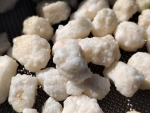
How to sustainably remove and recycle microplastics from water
We all pollute our water with things we use in our everyday lives. In the process, microplastics and micropollutants accumulate in sometimes significant quantities and are difficult to remove. This has increasingly devastating consequences for our health and the environment. Wasser 3.0, a non-profit start-up from Karlsruhe, has declared war on this problem by developing a customisable process to detect, remove and even recycle these pollutants.
https://www.biooekonomie-bw.de/en/articles/news/how-sustainably-remove-and-recycle-microplastics-water -
Press release - 27/10/2023 Lignin coating makes Geotextiles made from environmentally friendly natural fibers durable
Textiles are a given in civil engineering. Until now, textiles made of resistant synthetic fibers have been used for this purpose, having a long lifetime. For some applications, however, it would not only be sufficient but even desirable for the auxiliary textile to degrade when it has done its job. Natural fibers, in contrast, often decompose too quickly. The DITF are developing a bio-based protective coating that extends their service life.
https://www.biooekonomie-bw.de/en/articles/pm/lignin-coating-makes-geotextiles-made-environmentally-friendly-natural-fibers-durable -
Microorganisms degrade biobased turf infill - 17/10/2023 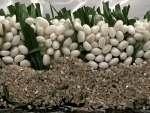
Eco-friendly artificial turf: a sports pitch that’s good for people and the environment
There are thousands of artificial turf pitches in Germany. They are extremely practical, but often not at all environmentally friendly. When it rains or the pitch is used, plastic particles from the rubber granules can be released into the envronment, where they remain. Researchers at the University of Stuttgart along with the company TECNARO are now developing an artificial turf with an infill that biodegrades as soon as it leaves the pitch.
https://www.biooekonomie-bw.de/en/articles/news/eco-friendly-artificial-turf-sports-pitch-s-good-people-and-environment -
Press release - 11/10/2023 Land Use: Producing More Food and Storing More Carbon
Doubling food production, saving water, and increasing carbon storage capacity – this may sound paradoxical, but would be theoretically feasible. Reaching this goal, however, would require a radical spatial reorganization of land use. This is the conclusion of researchers from Karlsruhe Institute of Technology (KIT) and the Heidelberg Institute for Geoinformation Technology (HeiGIT) of Heidelberg University.
https://www.biooekonomie-bw.de/en/articles/pm/landnutzung-mehr-nahrung-produzieren-und-gleichzeitig-mehr-kohlenstoff-speichern -
Press release - 09/10/2023 Microalgae: Environmentally friendly and healthy alternative to fish
Researchers at the University of Hohenheim are working on an alternative to fish consisting of microalgae. Advantage: Microalgae have high quality ingredients and also contribute to carbon storage.
https://www.biooekonomie-bw.de/en/articles/microalgae-environmentally-friendly-and-healthy-alternative-fish -
Preventing waste from instant meals - 05/10/2023 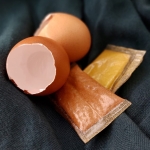
EDGGY: edible packaging film made from eggshell waste
Many instant meals such as ramen soups have both a protective outer packaging and individual ingredients in small plastic sachets. To prevent this environmentally harmful waste, five students at the University of Hohenheim have developed a sustainable film based on eggshells and plant proteins that dissolves in hot water and is edible.
https://www.biooekonomie-bw.de/en/articles/news/edggy-edible-packaging-film-made-eggshell-waste -
Press release - 29/09/2023 Ecological alignment of Artificial Intelligence
The European Parliament’s amendments to the proposal for a Regulation on Artificial Intelligence (AI) may be defined as a socio-ecological turnaround compared to the European Commission’s existing draft. The parliamentary draft proposes a series of environmental and climate-related provisions which, in the Oeko-Institut’s view, are feasible and technically achievable. The Oeko-Institut has reviewed these proposals in a Policy Paper.
https://www.biooekonomie-bw.de/en/articles/pm/ecological-alignment-artificial-intelligence -
Press release - 27/09/2023 Raw material requirements for reducing global poverty calculated for the first time
Researchers at the University of Freiburg quantify the amount of material needed to enable people to live without poverty. 1.2 billion people live in poverty. To lift them out of it, an average of about six tons of raw materials are needed per person and year – in particular minerals, fossil fuels, biomass and metal ores. This is the result of a study by researchers from the Chair of Sustainable Energy and Material Flow Management.
https://www.biooekonomie-bw.de/en/articles/pm/raw-material-requirements-reducing-global-poverty-calculated-first-time -
Press release - 26/09/2023 Local Food Systems: How sustainable are the business models for local food chains?
Mobile units for processing fruit and vegetables on-site may play an important role in food supply in 2035. The EU’s FOX project investigated the form that such local food chains might take. To this end, Fraunhofer ISI developed future scenarios that could be used to test the viability of business models for regional food processing and distribution.
https://www.biooekonomie-bw.de/en/articles/pm/local-food-systems-how-sustainable-are-business-models-local-food-chains -
Press release - 25/09/2023 Autonomous outdoor navigation for machines used in farming, livestock and forestry
Autonomous and robust navigation is an essential capability for agricultural robots or machines that are to reach a new level of autonomy to manoeuver safely and reliably in their environment. Fraunhofer IPA will showcase what is currently technologically and economically feasible with live demos at agritechnica, the agricultural trade fair taking place in Hanover from November 12 to 18, 2023.
https://www.biooekonomie-bw.de/en/articles/pm/autonomous-outdoor-navigation-machines-used-farming-livestock-and-forestry -
Press release - 14/09/2023 The Cultivated B Initiated Pre-Submission Process towards EFSA Certification for Cultivated Sausage
The Cultivated B (TCB) began discussions with the European Food Safety Authority (EFSA) and officially entered the pre-submission process for novel food approval of a novel or non-farmed sausage product. Subsequent to the official submission, TCB will emerge as world’s first biotech company to apply for EFSA certification for cultivated meat. This is a pivotal first step in the evolution of the cultivated meat market.
https://www.biooekonomie-bw.de/en/articles/pm/cultivated-b-initiated-pre-submission-process-towards-efsa-certification-cultivated-sausage -
Event - - Bioeconomy Forum 2023
Berlin, Kongress/Symposiumhttps://www.biooekonomie-bw.de/en/events/bioeconomy-forum-2023 -
Food of the future: new production methods - 06/09/2023 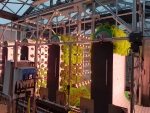
NewFoodSystems: innovation space for tomorrow’s food
A rapidly growing world population and simultaneously rapidly shrinking arable land – these are just some of the major challenges facing the food industry. But how can solutions be found? Answers are being sought by the bioeconomy innovation space NewFoodSystems. Funded by the German Federal Ministry of Education and Research (BMBF), it is a network where science and industry can come together to develop sustainable food systems of the future.
https://www.biooekonomie-bw.de/en/articles/news/newfoodsystems-innovation-space-tomorrows-food -
Press release - 30/08/2023 Soil Salinity: Wild Grapevine Defends Itself
Rising sea levels due to climate change and artificial irrigation cause soil salinity to increase. This has a negative impact on agriculture, including viticulture. The plants die, yields decrease. Researchers of Karlsruhe Institute of Technology (KIT) have therefore studied a wild grapevine of higher salt tolerance. Their goal is to identify the genetic factors that make the grapevine resilient.
https://www.biooekonomie-bw.de/en/articles/pm/soil-salinity-wild-grapevine-defends-itself -
Press release - 07/08/2023 Vegan trend in Europe: In Germany, milk substitutes from plants are most popular alternative
Germany has the most active market, Southern Europe wants more variety, and people in Poland find dairy substitutes too expensive, according to a recent study by the University of Hohenheim.
https://www.biooekonomie-bw.de/en/articles/pm/vegan-trend-europe-germany-milk-substitutes-plants-are-most-popular-alternative -
-
-
-
Press release - 27/07/2023 Self-healing plastic becomes biodegradable
Konstanz chemists develop mineral plastics with numerous positive properties from sustainable basic building blocks and, together with biologists, demonstrate the material's excellent microbiological degradability.
https://www.biooekonomie-bw.de/en/articles/pm/Self-healing-plastic-becomes-biodegradable -
Press release - 27/07/2023 Materials Research: Biocatalytic Foams of Tremendous Stability and Activity
Industrial biocatalysis with enzymes is deemed to be a “game changer” in the development of a sustainable chemical industry. Enzymes can be used to synthesize an impressive range of complex molecules. Researchers of KIT have now developed a new class of materials by producing enzyme foams of tremendous stability and activity. The researchers have already filed a patent application on the process to produce enzyme foams.
https://www.biooekonomie-bw.de/en/articles/pm/materials-research-biocatalytic-foams-tremendous-stability-and-activity -
Press release - 25/07/2023 Glyphosate impairs learning in bumblebees
What impacts do agrochemicals have on the ongoing global insect decline? Biologists at the University of Konstanz have found out that aversive learning is impaired in bumblebees exposed to glyphosate. Their study is published in the journal Science of the Total Environment.
https://www.biooekonomie-bw.de/en/articles/pm/glyphosate-impairs-learning-bumblebees -
Press release - 25/07/2023 Green Genetic Engineering: Making Mendel’s Dream Come True with Molecular Scissors
Molecular biologist Professor Holger Puchta from KIT is granted funding within a Reinhart Koselleck Project by the German Research Foundation (DFG) for work on specific restructuring of plant genomes. Puchta, a pioneer of green genetic engineering, has used molecular scissors in plants for 30 years now. His new project is aimed at using the CRISPR/Cas method to freely combine genes in crops, thus making Gregor Mendel’s dream come true.
https://www.biooekonomie-bw.de/en/articles/pm/green-genetic-engineering-making-mendels-dream-come-true-molecular-scissors -
Press release - 21/07/2023 Biosurfactants might offer an environmentally friendly solution for tackling oil spills
Can biosurfactants increase microbiological oil degradation in North Sea seawater? An international research team from the universities of Stuttgart und Tübingen, together with the China West Normal University and the University of Georgia, have been exploring this question and the results have revealed the potential for a more effective and environmentally friendly oil spill response.
https://www.biooekonomie-bw.de/en/articles/pm/biosurfactants-might-offer-environmentally-friendly-solution-tackling-oil-spills -
Press release - 18/07/2023 Robotically manufactured timber construction as a model for resource-efficient construction
As the world's population continues to grow, the construction industry faces the challenge of using fewer resources and switching to sustainable materials. Scientists from the Universities of Stuttgart and Freiburg are developing new interdisciplinary approaches to construction for the future.
https://www.biooekonomie-bw.de/en/articles/pm/robotically-manufactured-timber-construction-model-resource-efficient-construction -
Press release - 12/07/2023 Danger for the world's oceans and biodiversity
Insightful study with participation from the University of Konstanz warns of human-induced impacts on the marine ecosystem.
https://www.biooekonomie-bw.de/en/articles/pm/gefahr-fuer-weltmeere-und-biodiversitaet -
Press release - 10/07/2023 Freiburg researchers investigate wildlife populations in ten large protected areas in Germany for the first time
7591 red deer, 3443 roe deer, 4876 wild boar, 36 wolves, 16 lynxes and 227 red foxes: These are the results of the first standardised monitoring of wildlife populations in ten large protected areas in Germany. It was carried out by scientists at the University of Freiburg led by Prof. Dr. Marco Heurich and Dr. Christian Fiderer from the Faculty of Environment and Natural Resources.
https://www.biooekonomie-bw.de/en/articles/pm/freiburg-researchers-investigate-wildlife-populations-ten-large-protected-areas-germany-first-time -
Event - - Cellulose Fibres Conference
Cologne and Online, Kongress/Symposiumhttps://www.biooekonomie-bw.de/en/events/cellulose-fibres-conference -
Press release - 30/06/2023 Rain-Retaining Living Wall combines densification with flood protection
Climate change is causing temperatures to rise and storms to increase. In inner cities, summers are becoming a burden for people. Densification increases the amount of sealed surfaces. Green facades bring more green into cities. If textile storage structures are used, they can even actively contribute to flood protection. The German Institutes of Textile and Fiber Research (DITF) have developed a "Living Wall".
https://www.biooekonomie-bw.de/en/articles/pm/rain-retaining-living-wall-combines-densification-flood-protection -
Press release - 26/06/2023 How coral reefs can survive climate change
Astonishing results published from individual projects of the Tara Pacific expedition studying coral reefs – the entire dataset is made publicly available – coordinator is a biologist from the University of Konstanz
https://www.biooekonomie-bw.de/en/articles/pm/how-coral-reefs-can-survive-climate-change -
Press release - 21/06/2023 Technology Assessment: KIT Advises Bundestag for Another Five Years
The Institute for Technology Assessment and Systems Analysis of Karlsruhe Institute of Technology (KIT) has been entrusted with the continued operation of the Office of Technology Assessment at the German Bundestag (TAB) in the next five years until 2028. This unanimous decision was taken by the Parliament Committee for Education, Research, and Technology Assessment during today’s meeting (June 21, 2023).
https://www.biooekonomie-bw.de/en/articles/pm/Technology-Assessment-KIT-Advises-Bundestag-for-Another-Five-Years -
Innovative materials - 14/06/2023 
Reinventing ‘wood’ with programmable bacteria
Conserving wood by producing furniture and other objects from wood-based materials with the help of microorganisms? That is exactly what a team of researchers from the University of Freiburg and the Leibniz Institute for New Materials (INM) in Saarbrücken is working on in the DELIVER project. The aim is to create a database of materials with a broad range of controllable properties for various applications that can be produced from wood waste.
https://www.biooekonomie-bw.de/en/articles/news/reinventing-wood-programmable-bacteria -
Press release - 30/05/2023 Light conveyed by the signal transmitting molecule sucrose controls growth of plant roots
Team of Freiburg researchers shows how information about the quantity of absorbed light passes from the leaves to the roots. Plant growth is driven by light and supplied with energy through photosynthesis by green leaves. It is the same for roots that grow in the dark – they receive the products of photosynthesis, in particular sucrose, i.e. sugar, via the central transportation pathways of phloem.
https://www.biooekonomie-bw.de/en/articles/pm/licht-steuert-das-wachstum-von-pflanzenwurzeln-vermittelt-durch-das-signalmolekuel-saccharose -
Press release - 24/05/2023 Finally delicious: New proteins to revolutionize gluten-free baked goods
Daisies, peas, canola, etc.: Researchers at the University of Hohenheim want to replace gluten protein with new alternatives. Instead of ovens, 3-D printers would be possible
https://www.biooekonomie-bw.de/en/articles/pm/endlich-lecker-neue-proteine-sollen-glutenfreie-backwaren-revolutionieren -
Press release - 22/05/2023 How plants use sugar to produce roots
Along with sugar reallocation, a basic molecular mechanism within plants controls the formation of new lateral roots. An international team of plant biologists has demonstrated that it is based on the activity of a certain factor, the target of rapamycin (TOR) protein.
https://www.biooekonomie-bw.de/en/articles/pm/how-plants-use-sugar-produce-roots -
3D-Thermocell project - 17/05/2023 
Paper instead of plastic: sustainable packaging with a good conscience
Replacing plastic – for example in packaging – is not that easy but nevertheless urgently needed. In the 3D-Thermocell project, researchers at DHBW Karlsruhe are currently developing new plastic substitute products made of thermoformable paper as a renewable resource, which should be cheap and light and easy to dispose of along with waste paper. The characterisation and application of demonstration models will start soon.
https://www.biooekonomie-bw.de/en/articles/paper-instead-plastic-sustainable-packaging-good-conscience -
Press release - 16/05/2023 Biocomposite at the Venice Architecture Biennale
This year's Venice Architecture Biennale sees itself as a "Laboratory of the Future". Bio-composites are not just dreams of the future in architecture. The German Institutes of Textile and Fiber Research (DITF) have developed a sustainable material for support profiles and connecting nodes, which will be on display at Palazzo Mora during the Biennale from May 20 to November 26.
https://www.biooekonomie-bw.de/en/articles/pm/bioverbundwerkstoff-auf-der-architektur-biennale-venedig -
Diatoms as a biorefinery - 05/05/2023 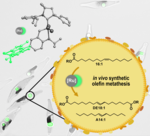
Microalgae: sustainable chemical production in a mini factory
Renewable raw materials that can be used as alternatives to fossil resources already exist. However, to turn them into everyday products, plant oils and other renewable raw materials not only have to be extracted, but often have to undergo complex chemical processing. Researchers at the University of Konstanz have now converted microalgae cells into tiny refineries to produce and upgrade raw materials, creating a supply of sustainable chemicals.
https://www.biooekonomie-bw.de/en/articles/news/microalgae-sustainable-chemical-production-mini-factory -
Press release - 03/05/2023 Rapeseed makes more than just oil – it’s a source of proteins too
At the Fraunhofer Center for Chemical-Biotechnological Processes CBP in Leuna, Germany, representatives from politics, research and industry opened a novel pilot plant for the mild processing of rapeseed to increase the added-value potential of rape as a raw material.
https://www.biooekonomie-bw.de/en/articles/pm/nicht-nur-oel-auch-proteine-aus-raps